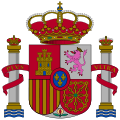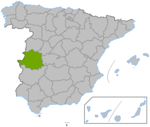- Cáceres (Spanish Congress Electoral District)
-
Cáceres is one of the 52 electoral districts (circunscripciones) used for the Spanish Congress of Deputies - the lower chamber of the Spanish Parliament, the Cortes Generales. It is one of two electoral districts which correspond to the provinces of Extremadura. Cáceres and Plasencia are the largest municipalities.
Contents
Boundaries and electoral system
Under Article 68 of the Spanish constitution [1] the boundaries must be the same as the province of Cáceres and under Article 140 this can only be altered with the approval of congress. Voting is on the basis of universal suffrage in a secret ballot. The electoral system used is closed list proportional representation with seats allocated using the D'Hondt method. Only lists which poll 3% or more of all valid votes cast, including votes "en blanco" i.e. for "none of the above" can be considered for seats. Under article 12 of the constitution, the minimum voting age is 18.
Spain 
This article is part of the series:
Politics and government of
SpainLegislature- Cortes Generales
- Congress of Deputies
- President
- Senate
- President
- Congress of Deputies
- Opposition Leader
- People's Defender
- Court of Accounts
- General Council of the Judiciary
- Supreme Court
- Audiencia Nacional
Divisions- Autonomous
communities- Reg. governments
- Reg. legislatures
- Provinces
- Comarcas
- Municipalities
Foreign policy
Eligibility
Article 67.3 of the Spanish Constitution prohibits dual membership of the Cortes and regional assemblies, meaning that candidates must resign from Regional Assemblies if elected. Article 70 also makes active judges, magistrates, public defenders, serving military personnel, active police officers and members of constitutional and electoral tribunals ineligible.[1]
Number of members
From the 1977 General Election onwards Cáceres returned five members. It was reduced to its current allocation of four members for the 2004 General Election.
Under Spanish electoral law, all provinces are entitled to a minimum of 2 seats with a remaining 248 seats apportioned according to population.[2] These laws are laid out in detail in the 1985 electoral law. (Ley Orgánica del Régimen Electoral General) The practical effect of this has been to overrepreseent smaller provinces at the expense of larger provinces. Cáceres had a ratio of 87,312 voters per deputy in 2008,[3] a figure below the Spanish average of 100,210 voters per deputy.
Summary of seats won 1977–2008
1977 1979 1982 1986 1989 1993 1996 2000 2004 2008 Democratic Centre Union (UCD) 4 3 Spanish Socialist Workers' Party (PSOE) 1 2 4 3 3 3 3 2 2 2 People's Party (PP) 1 2 2 2 2 3 2 2 Note: Seats shown for the PP include seats won by their predecessors, the Popular Alliance and Popular Coalition before 1989.
1977 1979 1982 1986 1989 1993 1996 2000 2004 2008 Democratic Centre Union (UCD) 55.3 47.1 12.7 Spanish Socialist Workers' Party (PSOE) 26.2 38.0 52.5 53.8 52.6 50.8 47.9 44.6 50.5 52.2 People's Party (PP) 9.3 4.1 24.5 27.7 27.2 36.9 42.0 47.8 43.5 41.9 United Left (IU) 3.3 5.2 1.6 2.0 5.1 6.0 7.3 3.7 2.8 2.7 Democratic and Social Centre (CDS) 1.9 7.3 8.8 2.3 0.2 0.1 0.1 Results
2008 General Election
While Plasenica produced a result close to the average (50.7% for PSOE and 42.2% for PP), The PP outpolled the PSOE in Cáceres taking 49.3% against 42.9% for the latter.
Summary of the 11 March 2008 Congress of Deputies election results in Cáceres. Parties and alliances Votes % Seats Members elected Spanish Socialist Workers' Party (Partido Socialista Obrero Español) 142,003 52.21 2 People's Party (Partido Popular) 113,819 41.85 2 Amador Álvarez United Left 7,409 2.72 0 Union, Progress and Democracy 2,073 0.76 0 Others 4,416 1.6 0 2004 General Election
Summary of the 14 March 2004 Congress of Deputies election results in Cáceres. Parties and alliances Votes % Seats Members elected Spanish Socialist Workers' Party (Partido Socialista Obrero Español) 137,654 50.53 2 People's Party (Partido Popular) 118,627 43.54 2 Amador Álvarez United Left 7,569 2.78 0 Others 5,265 1.9 0 Source: [4]
2000 General Election
Summary of the 12 March 2000 Congress of Deputies election results in Cáceres. Parties and alliances Votes % Seats Members elected People's Party (Partido Popular) 123,577 47.76 3 Amador Álvarez Spanish Socialist Workers' Party (Partido Socialista Obrero Español) 115,435 44.62 2 United Left 9,463 3.66 0 Others 7,449 2.9 0 1996 General Election
Summary of the 3 March 1996 Congress of Deputies election results in Cáceres. Parties and alliances Votes % Seats Members elected Spanish Socialist Workers' Party (Partido Socialista Obrero Español) 131,616 47.9 3 People's Party (Partido Popular) 115,444 42.01 2 Amador Álvarez United Left 20,068 7.3 0 Others 5,664 2.1 0 1993 General Election
Summary of the 6 June 1993 Congress of Deputies election results in Cáceres. Parties and alliances Votes % Seats Members elected Spanish Socialist Workers' Party (Partido Socialista Obrero Español) 131,853 50.81 3 People's Party (Partido Popular) 95,628 36.85 2 Amador Álvarez United Left 15,662 6.04 0 Democratic and Social Centre (CDS) 5,941 2.29 0 Others 8,992 3.5 0 External links
References
- ^ a b Spanish Constitution
- ^ General features of Spanish electoral system
- ^ Cáceres election result 2008
- ^ Interior ministry link to election results
Electoral districts of the Spanish Congress of Deputies Álava · Albacete · Alicante · Almería · Asturias · Ávila · Badajoz · Balearic Islands · Barcelona · Biscay · Burgos · Cáceres · Cádiz · Cantabria · Castellón · Ceuta · Ciudad Real · Córdoba · A Coruña · Cuenca · Girona · Granada · Guadalajara · Gipuzkoa · Huelva · Huesca · Jaén · León · Lleida · La Rioja · Lugo · Madrid · Málaga · Melilla · Murcia · Navarre · Ourense · Palencia · Las Palmas · Pontevedra · Salamanca · Santa Cruz de Tenerife · Segovia · Seville · Soria · Tarragona · Teruel · Toledo · Valencia · Valladolid · Zamora · ZaragozaCategories:- Electoral Districts of the Congress of Deputies (Spain)
- Cáceres Province
- Cortes Generales
Wikimedia Foundation. 2010.

